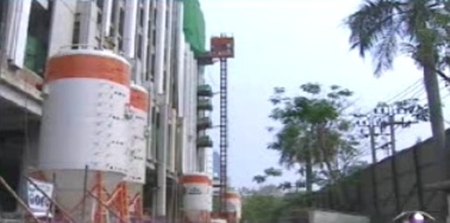The number of real estate projects–particularly condominiums–in the Thai capital is the highest in the ASEAN countries and triples that of Jakarta, which ranks second highest, according to the Thai Appraisal Foundation. Analysts around the region are closely monitoring the fast growing housing projects here.
In the first nine months of this year, new condominiums in Bangkok sprouted up at the rate of 42 per cent year-on-year.
According to the Real Estate Information Centre, skyrocketing condominium construction is caused by many factors–changing weather, flood-prone locations, more strict related law, urban lifestyles, and elevated and underground electric mass transit extension.

Government Housing Bank real estate information center director Samma Kitsin said four locations studded with condominiums are Huay Kwang-Chatuchak, the Bangna end of Sukhumvit Road in Bangkok, the tourist and industry-concentrated province of Chonburi and the seaside resort zone of Hua Hin and Cha-am.
More condominiums are on the way as developers and investors see a rising future housing demand, particularly after the formation of the ASEAN Economic Community in 2015.
“The condominium market is highly competitive. Projects not achieving target sales quotas set by the financial institution will not be given financial credit to continue, so construction will be put on hold,” Mr Samma said.
Thai Appraisal Foundation president Sophon Pornchokchai sees condominium sales accounting for 70 per cent of housing market shares. The ratio of home buyers and speculators is 2:1 now.
Real estate prices slightly increase by five per cent annually and there is no sign of a real estate bubble, he added.
“Currently, finished condominiums are mostly occupied by the owners themselves. This is not a problem, but if it grows unstoppably, it is not a good sign and the growth is probably related to purchasing for speculation. In some countries, speculation can be prevented as banks do not give loans to speculators,“ he said.
In Singapore, home buying tax is collected at a progressive rate to reduce speculation in the real estate market. On the contrary, Thai government’s policies aim to help low- and middle-income earners through projects like Baan Uea Arthorn or low-cost housing projects and the first home buyers scheme which has been extended to March 2013.
If the government can control speculation and build stability in the real estate sector, it will be a significant income boost for the government to support the continuity of its welfare policies to assist low income earners.




